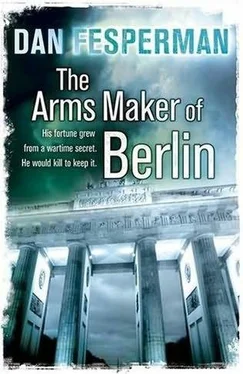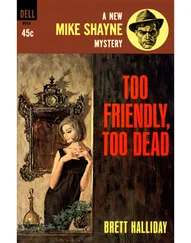Dan Fesperman - The Arms Maker of Berlin
Здесь есть возможность читать онлайн «Dan Fesperman - The Arms Maker of Berlin» весь текст электронной книги совершенно бесплатно (целиком полную версию без сокращений). В некоторых случаях можно слушать аудио, скачать через торрент в формате fb2 и присутствует краткое содержание. Жанр: Триллер, на английском языке. Описание произведения, (предисловие) а так же отзывы посетителей доступны на портале библиотеки ЛибКат.
- Название:The Arms Maker of Berlin
- Автор:
- Жанр:
- Год:неизвестен
- ISBN:нет данных
- Рейтинг книги:5 / 5. Голосов: 1
-
Избранное:Добавить в избранное
- Отзывы:
-
Ваша оценка:
- 100
- 1
- 2
- 3
- 4
- 5
The Arms Maker of Berlin: краткое содержание, описание и аннотация
Предлагаем к чтению аннотацию, описание, краткое содержание или предисловие (зависит от того, что написал сам автор книги «The Arms Maker of Berlin»). Если вы не нашли необходимую информацию о книге — напишите в комментариях, мы постараемся отыскать её.
The Arms Maker of Berlin — читать онлайн бесплатно полную книгу (весь текст) целиком
Ниже представлен текст книги, разбитый по страницам. Система сохранения места последней прочитанной страницы, позволяет с удобством читать онлайн бесплатно книгу «The Arms Maker of Berlin», без необходимости каждый раз заново искать на чём Вы остановились. Поставьте закладку, и сможете в любой момент перейти на страницу, на которой закончили чтение.
Интервал:
Закладка:
Göllner emerged from the confrontation with the names, roles, and contact information of every local member of the White Rose. Kurt came away with a few lukewarm assurances that had strings attached. The biggest of those-a promise to let his family hold on to its business empire-had never been in doubt to begin with, as Göllner well knew.
Would the Gestapo have discovered the White Rose names anyway, through interrogations elsewhere? Göllner implied as much to Kurt, but later told his superiors that he doubted it. The Munich interrogations of Falk Harnack and Jörg Strasser hadn’t yielded a word about White Rose activity in Berlin, although the two men would certainly be asked about it now, if only to double-check Kurt’s offerings.
For Göllner the most sensitive issue was Kurt’s insistence on serving a prison sentence along with his friends. No doubt the boy wanted to convince the others that he hadn’t been the rat aboard their sinking ship. He also wanted to assuage his guilt and impress his girlfriend. But incarcerating any Bauer would be a hard sell with Göllner’s superiors. He got them to go along only after convincing them that he could leverage the results of the family’s racial background check against Kurt’s father, Reinhard.
On the Saturday morning before the fateful birthday party, Göllner worked out the final details with Reinhard himself, face-to-face. Before telephoning to arrange the meeting, Göllner allowed Kurt to warn his father in advance. That meant he had to tell his father about everything, which turned out to be harder than telling Göllner. Reinhard was furious about his son’s foolish White Rose activities, not to mention the boy’s defiance in continuing to see Liesl against his wishes. But once he got over his anger he earnestly got down to the business of trying to work out the best possible deal for Kurt and the family.
The meeting was at the office of Göllner’s supervisor, on Prinz-Albrecht-Strasse. Göllner relinquished the last of his precious coffee in order to display the proper hospitality. He assured the industrialist that for the good of the family-indeed, for the good of the country-his son Kurt would have to spend several months in Plötzensee Prison. Reinhard grimly assented.
The only other sticking point was the matter of Kurt’s girlfriend, Liesl Folkerts. Reinhard had no interest at all in protecting her, but Kurt wanted her freedom ensured. The complication was that she had already come to the Gestapo’s attention, from a nosy old charwoman who overheard Liesl telling a crude joke about Hitler at a charity sale of used clothing. As if that weren’t enough, a second woman had then witnessed her pressing a wool scarf on an elderly shopper while saying, “Please, take it. It’s not as if the government is going to help you.”
One of Göllner’s colleagues had begun building a dossier on the girl, a body of evidence that now had to be set aside in favor of the arrangement worked out with the younger Bauer. In exchange for this accommodation, Kurt agreed to enter the army three weeks after his release. The gesture was largely symbolic, as he would have been due to report on his eighteenth birthday anyway. Still, families as prominent as the Bauers had been finding ever more creative ways to keep their sons out of the military.
For Göllner, then, the hard part was done. The dirty work would be left to the four officers who carried out the raid. He would then help interrogate the suspects, although he figured they would have little to offer beyond what Kurt had already told them.
For Kurt Bauer, on the other hand, the worst was yet to come. He prepared for the birthday party as if for a funeral, keeping mostly to his room and moping the way his sister had after her broken engagement. He exited the house only once in the preceding days, to shop for a birthday present for Dieter. He found himself putting a lot of thought into it and wound up using nearly all of the family’s monthly clothing coupons to purchase a fine woolen scarf. Maybe it would keep Dieter warm in prison, he thought, little knowing the boy’s neck would need far more protection than a strip of cashmere.
Göllner had assured him the raid would be carried out with as little fuss as possible, but Kurt wasn’t convinced. When the evening arrived, he rode his bicycle to Liesl’s house to escort her there. He pinged the bell in hopes that he wouldn’t have to face her parents, but her father came to the door and beckoned him inside. Everyone was all smiles. By now Liesl’s parents thought of him as a polite and humble gentleman. He smiled thinly and said little. At least they wouldn’t have to witness the awful moment of their daughter’s arrest.
As they mounted their bikes, it occurred to him that the Gestapo might already have them under surveillance. He imagined officers hiding in the trees, watching with binoculars.
“Kurt, what’s wrong?” Liesl asked. “You’re so quiet. Has something happened?”
He blinked in confusion, wondering what to say.
“It’s my sister, Traudl,” he stammered. “She’s still so upset.”
Liesl laid a hand across his.
“I really do think your family is going to be okay. Cheer up. Tomorrow is the first day of spring. I even saw a crocus yesterday. Even the war can’t stop them.”
She squeezed his hand. He nodded grimly, and for a fleeting moment he considered telling her everything. They could escape through the forest, pedal to a train station to flee south toward Switzerland, crossing the Alps to safety. Just Liesl and him, enduring like the crocuses. But he knew she would never come, not if he told her. She would be furious, lost forever. Worse, she would try to warn everyone, and the evening would turn dangerous, even deadly. Pursuit and gunshots, shrill whistles and snarling dogs. They pedaled away in silence. By the time they reached Dieter’s house his mouth was so dry that he could barely swallow.
It was the first time he had met Dieter’s parents. Mrs. Büssler was like her son, showy and boastful in speech, reserved and cautious in manner, as if harboring a deep insecurity. Mr. Büssler was a quiet man with a pipe who seemed resigned to a secondary role in the household. As soon as the guests arrived he retreated to a back room with his newspaper.
Nearly everyone was there-seven of them in all, just as Kurt had promised Göllner. Helmut Hartert had recently been called into military service, and presumably would be dealt with elsewhere. Harnack was still with his army unit in Chemnitz. The idea that everything might go off without a hitch was both exciting and horrifying. In the ensuing small talk Kurt hardly knew what he was saying, and every few minutes he checked his watch, not knowing when and how the Gestapo would announce its presence.
After an hour, Dieter’s mother brought out a rather sad-looking ham that they must have been saving for a special occasion, plus bowls of potatoes and creamed spinach. She poured a jug of homemade wine into the punch. Kurt drank freely of it, and by the end of his third glass everyone began to seem cheerful and relaxed, so much so that he allowed himself to fancy that maybe Göllner had gotten the date wrong, or fouled up the address. Better still, maybe his father had somehow engineered a last-minute reprieve, using his connections to put a stop to this nonsense. They were only students, after all. Surely a man of such value to the war effort had enough clout to prevent the arrests of a handful of upper-class children? What were a few pamphlets when stacked against the might of the Bauer war machine? Kurt took his empty glass for another refill, his cheeks flushed with false hope. He even managed a smile for Hannelore when he noticed her watching him.
Then came the first knock. It sounded normal, even gentle, and at first only Kurt heard it. Perhaps it was a neighbor, or a family friend bearing gifts.
Читать дальшеИнтервал:
Закладка:
Похожие книги на «The Arms Maker of Berlin»
Представляем Вашему вниманию похожие книги на «The Arms Maker of Berlin» списком для выбора. Мы отобрали схожую по названию и смыслу литературу в надежде предоставить читателям больше вариантов отыскать новые, интересные, ещё непрочитанные произведения.
Обсуждение, отзывы о книге «The Arms Maker of Berlin» и просто собственные мнения читателей. Оставьте ваши комментарии, напишите, что Вы думаете о произведении, его смысле или главных героях. Укажите что конкретно понравилось, а что нет, и почему Вы так считаете.












